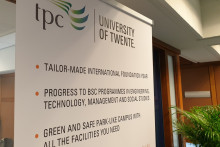Where did the idea for the minor come from?
Anne Olde Loohuis: ‘We have been working on a university-wide project Employability of International Students. We have picked up on signals that there is a need for such an initiative. National survey shows that 57% of international students would like to stay in the Netherlands, but only 25% of the them are still here five years after graduation. At the same time, there is a need for skilled graduates and, as the UT and the region, we would like to keep talent in Twente, and so we decided to address this issue.’
‘We have looked into what prevents international students from entering the Dutch job market and we found out that they often lack Dutch language skills, as well as knowledge of the Dutch work culture. Students experience difficulties to work on these skills during their studies. We therefore wanted to incorporate it in their curriculum and came up with the idea for the minor.’
When will the minor be available?
‘It will already be on offer in the academic year 2022-2023. We will present it at the minor fair organized next week at the UT, after which students can already apply for it.’
Can anyone at the UT register for it?
‘It is available to non-Dutch students from any bachelor programme and we can recommend it to anyone who wishes to seriously explore career opportunities in the Netherlands. The first pilot will be relatively small, so that we can properly evaluate it and tweak it if necessary. The only requirement for signing up is speaking Dutch at A2 level. However, students can still apply even if they aren’t at that level yet. The UT Language Centre will offer free summer courses, so that students can get to A2 level in time. This minor is only for bachelor students, but we are also aiming to develop a similar offer for Master student and PhDs.’
What is the content of the minor?
‘It consists of three courses: Dutch Language Course, Adjusting to the Dutch Labour Market and Organisational Cultures and Consultancy in the Netherlands. Students will learn to speak Dutch at a B1-level and to understand Dutch culture and labour market. They will acquire skills on how cross-cultural differences can be dealt with in the workplace. Also, they will build connections by doing a challenge-based consultancy assignment in a Dutch company. The minor also includes field visits to companies, so that students can see for themselves and expand their network.’
What do you hope the new minor will contribute to?
‘Of course we hope it will help students to build a career in the Netherlands. I also hope businesses here in the region will become aware of what international students have to offer, and how they can contribute to the increasing need for skilled graduates.’








